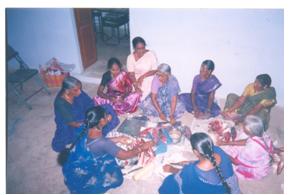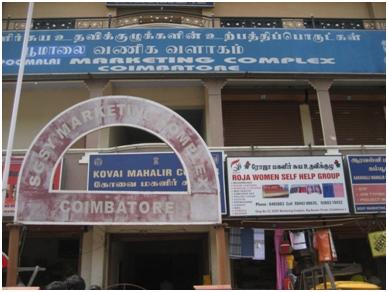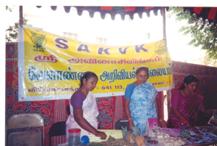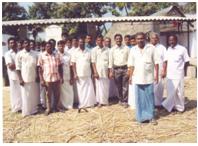FACILITIES TO SHG
- Training
- Marketing facilities
- Award
- Role of NGOs
TRAINING
Training programmes are important because they
- expand knowledge base
- try to bring about changes in our attitudes
- impart new skills and build upon our existing skills

The Tamil Nadu Women's Development Project (Mahalir Thittam) is different from other Government schemes because its implementing agencies (Government NGO & Banks) have diverse backgrounds requiring a common understanding of project goals, co-ordination and co-operation amongst themselves.
Training would be given to animators, representatives, group (directly) cluster level representatives and borrower-members. The training would also include refresher training and exposure visits to other groups. NGO staff would also receive minimum essential training. PIU and PMU officers and staff and bankers would also be given training.
Training module
The different types of training envisaged for different project participants are:
- SHG Members training
- Animators and Representatives Training
- Representatives training(II Year Onwards)
- Cluster level representatives training
- NGO staff training
- Bank Staff training
- PIU Staff training
- PMU staff training
- Training for communication teams
- Skill training for economic activities
The hallmark of the SHGs promoted by Mahalir Thittam is the systematic training provided to the SHG members and the office bearers. This capacity building brings about qualitative changes in the attitude of the women and promotes cohesion and effective functioning of the group.
All the SHG members are imparted training in 4 modules for 4 days to orient them to the SHG concept. The office bearers of the SHGs (Animator and Representative) are given training in 3 modules for 6 days. This training enhances the leadership quality, team building spirit and capacity to maintain books of accounts. In addition, SHG members who are interested in starting economic activities or develop skills to get self employment are provided skill training and entrepreneurship development training. The skill training includes a 5 day capsule on entrepreneurial development.
Besides this, district level and block level marketing workshops will also be conducted to familiarize the SHG women with marketing techniques and to the concepts of quality, pricing ,packaging and promotion.
Capacity Building Training to SHG
There two types
1.Animator & representative training ( i.e office beares of the SHG.)
2.SHG members training.
Duration
Shg members training - 4 days
Animator & representative training - 6 days
Stipend
- For Trainees - Rs. 45/day/head
- For NGOs - Rs. 12.50/day/head
- For Trainers - Rs.10 for A & R training , Rs 7.50 for SHG training.
Skill Training for Youth
Given the popularity of the State as an industrial investment destination, there is huge demand for skilled manpower in manufacturing and services sector. By providing relevant skill training, unemployed youth can be productively engaged benefiting the society as well as the individual. With this objective in mind, TNCDW has imparted skill training to 11,485 youth through reputed industrial houses and institutions like MRF, NOKIA, Saint Gobain among others.
In the year 2008-2009, it is proposed to provide skill training to 25000 youth through reputed industrial houses and other institutions.
Eligibility Criteria For Selected The Candidates
- Age : 18-35 yrs
- Education : 10 th pass / fail
Stipend for youth skill training
- Mahalir thittam offers Rs. 10000/- candit to the concern training institution for providing training.
- Candidates are given Rs. 750/- for the entire duration as stiphend
Action plan for youth skill training for the year 2008-09 (Coimbatore)
S.No |
Name of the Trade |
No.of Trainees |
Training Duration |
Name of the Institution |
| 1 |
CNC Lathe Operator |
100 |
3 months |
Sri Ramakrishna Mission Vidyalaya ITI, P.N.Palayam, Coimbatore. |
| 2 |
CNC milling operator |
100 |
3 months |
| 3 |
Fitter |
50 |
3 months |
| 4 |
Lathe operator |
100 |
3 months |
| 5 |
Electrician |
100 |
3 months |
| 6 |
Driver |
150 |
3 months |
| 7 |
Computer hardware maintenance |
100 |
3 months |
| 8 |
Cell phone service |
100 |
3 months |
| 9 |
Refrigeration& air cooling |
100 |
3 months |
| 10 |
Four wheeler mechanism |
100 |
3 months |
| |
Total |
1000 |
|
| 1 |
Weavers training |
40 |
1 month |
South India Textile Research Association, Coimbatore. |
| 2 |
Fitter training programme |
40 |
1 month |
| 3 |
Computer aided textile design (CAD) |
40 |
1 month |
| 4 |
Knitting machine operator |
40 |
1 month |
| 5 |
Knitting machine maintenence |
40 |
1 month |
| |
Total |
200 |
|
Indian Institute of Catering& Hotel Management |
| 1 |
Catering & Food Production |
100 |
3 months |
| 2 |
Tailoring |
100 |
3 months |
| |
Total |
200 |
|
Premier Fashions,Coimbatore |
| 1 |
Merchandising |
50 |
3 months |
| 2 |
Machine Embroidery |
50 |
3 months |
| 3 |
Stitching |
50 |
3 months |
| |
Total |
150 |
|
| 1 |
Electronic servicing & maintenance |
30 |
3 months |
Skills Academy, Coimbatore |
| 2 |
Refrigeration&air conditioning |
30 |
3 months |
| 3 |
Computer hareware technology |
30 |
3 months |
| 4 |
Mobile phone technology |
30 |
3 months |
| 5 |
Basic computer |
30 |
3 months |
| |
Total |
150 |
|
| |
Grand Total |
1700 |
|
Women skill training
| S.No |
Training Details |
Institution |
Numbers |
| 1 |
Designing & textile production |
Kumarakuru College , Coimbatore. |
40 |
| 2 |
Embroidery |
40 |
| 3 |
Saree printing & dyeing |
40 |
| 4 |
Saree designing |
40 |
| 5 |
Soft toys making |
|
| 6 |
Tailoring |
Indian Institute of Catering Technology & Hotel Management |
25 |
| 7 |
Collar stitching |
25 |
| 8 |
Catering |
30 |
| |
Total |
|
300 |
MARKETING FACILITIES

Poomalai vaniga valagam
Mahalir thittam facilitating markets for shg products through arrangement of marketing facilities such as shops at public places like bus stands, government commercial complexes…..etc. and helping SHGs to participate in the national, state,district level sales melas or exhibitions organized by govt. departments.
And the SHG’s products are being marketed at District Supply And Marketing society(DSMS) or poomalai vaniga valagam situated at every district headquarters and this is the place where SHG products are being marketed.
SHG group marketed their products in this complex. Some groups successfully run canteens in this complex.
AWARD - Manimegalai Award
To encourage well-functioning SHGs and PLFs, the Government had announced Manimegalai awards at State and district levels. Awards are presented to 5 best PLFs and 10 best SHGs at the State level. One PLF selected as best at the district level and 3 SHGs found to be the best at the district level are given Manimegalai awards and the best SHG at the Block level is given a certificate.
ROLE OF NGOs
NGOs have played a key role right from formation of women Self-Help Groups to attainment of women empowerment, by providing necessary training and other inputs. NGO and KVKs are pioneer in organizing self help group and linking of group with banks. The growth of SHG has been in the areas when they support from NGOs. They support not only in the formation of SHGs but also in identifying activities, imparting training and even financial support in the initial stage. NGOs fecilitate the self help group activities. NGOs selected as partners are assisted with support costs for SHG formation, monitoring SHGs .
The Role of NGOs are
- To conduct survey using techniques like social mapping, wealth ranking and PRA/PLA to identify and facilitate the poorest women to come together for the programme.
- Group formation.
- Help selection of animators by the group, Inform PIU regarding animator selected by group along with group resolution.
- Work continuously with the groups to make them strong, cohesive and sustainable.
- Motivate members for regular savings and assist the members in preparation of guidelines for usage of thrift fund and
- Monitor both savings and thrift fund usage.
- Assist in the formation and operation of Group Reserve Fund.
- Guide the animator, representatives and group in proper book keeping and record.
- Motivation and facilitation for achievement of social development aspects of the project.
- Advisor and facilitator to the groups on various matters social, economic, problem solving community action programmes, etc.,
- Provide continuing training and support to the animators, representatives, groups and cluster coordinators for management of savings and loan funds.
- Evaluate, assess impact of training programmes and make changes/corrections to programme.
- Monitor and evaluate fieldwork done by cluster coordinators and trainers.
- Assist group members in selecting suitable economic /income generation activities
- Assist formation of federations of women’s groups at different levels.
- Evaluate groups periodically and improve performance in all aspects.
- Ensuring and helping in prompt annual audit of books of accounts by each SHG.
- Ensure and institutionalise sustainability at every level so that SHGs graduate into self-reliant, financially sound and independent units.
- Promote entrepreneurship culture amongst SHGs by providing training for micro-enterprise development amongst SHGs.
- Assist SHGs and facilitate development of Income Generation Programmes amongst SHG members.
Role of Coordinator (NGO Field Worker)
- Motivate poor women to form SHGs
- Visit and motivate SHGs to meet regularly
- Give proper instructions to SHGs to correct mistakes in day to day management of SHGs
- Train SHGs in proper book keeping
- Assist SHGs in opening of bank accounts
- Assist SHGs in applying for and obtaining external credit.
- Motivate SHGs prompt repayment of all credit, internal and external.
- To facilitate and solve problems in Income Generation Programmes of SHGs.
PRA
Participatory rural appraisal (PRA) is an approach used by non-governmental organizations (NGOs) and other agencies involved in international development. The approach aims to incorporate the knowledge and opinions of rural people in the planning and management of development projects and programmes.
The NGOs is a very important stakeholder in the project and has to be therefore chosen carefully. Over years a fair and dependable selection process, involving an assessment team comprising of a Project officer from another district, an officer from DeW Chennai office and reputed NGO from another district, has been evolved and found effective. Once an NGO is selected, an agreement is executed with the NGO. Training for orientation & Capacity building of NGO staff is a major activity and important as far as NGO's are concerned.
Once a year an appraisal of performance(Grading) of each NGO is done by the Project Implementation Unit and areas of weaknesses identified for action by the NGO. NGOs are required to pay attention to overcoming these areas of concern, with PIU providing support.
NGOs APPROVED BY MAHALIR THITTAM
Krishi Vigyan Kendra
All KVKs are also concentrate in organizing and impart trainings to SHGs.

Training on food preservation techniques - SA, KVK, KARAMADAI, Coimbatore

MYRADA KVK- MEN SELF HELP GROUP |
